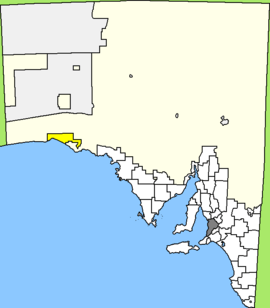Yalata, South Australia
| Yalata South Australia | |||||||
|---|---|---|---|---|---|---|---|
 Location of Yalata area (yellow) in South Australia | |||||||
| Coordinates | 31°29′S 131°50′E / 31.48°S 131.84°ECoordinates: 31°29′S 131°50′E / 31.48°S 131.84°E | ||||||
| Population | 100 (2006 census)[1] | ||||||
| • Density | 0.022/km2 (0.057/sq mi) | ||||||
| Established | 1994 | ||||||
| Elevation | 90 m (295 ft) | ||||||
| Area | 4,563 km2 (1,761.8 sq mi) | ||||||
| Location | |||||||
| LGA(s) | Aboriginal Council of Yalata | ||||||
| State electorate(s) | Flinders[2] | ||||||
| Federal Division(s) | Grey[3] | ||||||
| |||||||
Yalata is an Aboriginal community located 200 kilometres west of Ceduna on the Great Australian Bight in South Australia.
History
The community consists mainly of Anangu who lived in the spinifex country far to the north around Ooldea prior to their forced removal to Yalata in 1952. In the 1950s areas around Maralinga and Emu were used for Atomic Testing by the British Government of the day. Around this time the Australian Government resumed much Anangu land to be used for the Woomera Rocket testing Range. As a result, Anangu were moved to Ooldea in the first instance then later moved to the Yalata site. The Maralinga Tjarutja native title land was handed back to the Anangu under legislation passed by both houses of the South Australian Parliament in December 1984 and proclaimed in January 1985. The Yalata Aboriginal lands cover 4,580 km² and span approximately 150 km of the Eyre Highway. Inland Anangu resettled on the land in 1995 and forming a community at Oak Valley. Regular movement of Anangu between Yalata and Oak Valley occurs.
Environment
The Atlas of South Australia describes the Yalata area as:
sandy plain with deep sand and parabolic dunes. The vegetative cover is open mallee scrub with a mixed understory of chenopod shrubs and grasses and low open woodland with a chenopod shrub understory.
Demography
Anangu regard themselves as a Southern Anangu people and speak a Southern dialect of the Pitjantjatjara language.[4]
The ABS 2006 Yearbook indicates that Pitjantjatjara is spoken as the primary language in 58% of homes in Yalata.[5]
82% of residents identify their main religion as Lutheran.[5]
Facilities
Yalata Roadhouse, 200 km west of Ceduna, was operated by Yalata Aboriginal Community Incorporated. There is also a caravan park to assist tourists passing through or visiting the Great Australian Bight for fishing or whale watching.[6] The roadhouse was closed in February 2006.[7]
The lands of the Yalata bear their own name. A portion of these lands in South Australia's remote west, comprises Yalata, one of the four local government areas of South Australia classified as an Aboriginal Council (AC).
On 21 August 2007, the Adelaide Advertiser reported that fire had overnight destroyed the shed-structure police station and associated home, with damage costing approximately A$500,000.[8]
Governance
Yalata is governed at the local level by the Aboriginal Council of Yalata, one of the five local government bodies in South Australia classified as Aboriginal Councils (AC). At the state and federal levels, Yalata lies in the electoral district of Flinders and at the division of Grey, respectively.
References
- ↑ Australian Bureau of Statistics (25 October 2007). Yalata (Urban Centre/Locality). 2006 Census Quickstats. Retrieved on 25 May 2008
- ↑ "District of Flinders Background Profile". Electoral Commission SA. Retrieved 9 September 2015.
- ↑ "Federal electoral division of Grey, boundary gazetted 16 December 2011" (PDF). Australian Electoral Commission. Retrieved 20 August 2015.
- ↑ "Yalata Land Management". Retrieved 18 May 2006.
- 1 2 ABS 2006 YearbookRetrieved on 5 June 2008
- ↑ "Yalata". Nullarbor Net. Retrieved 21 May 2006.
- ↑ "Lease issues close roadhouse". Australian Broadcasting Corporation. Retrieved 28 April 2007.
- ↑ Fire destroys police station, Adelaide Advertiser, 21 August 2007 Retrieved on 21 August 2007
